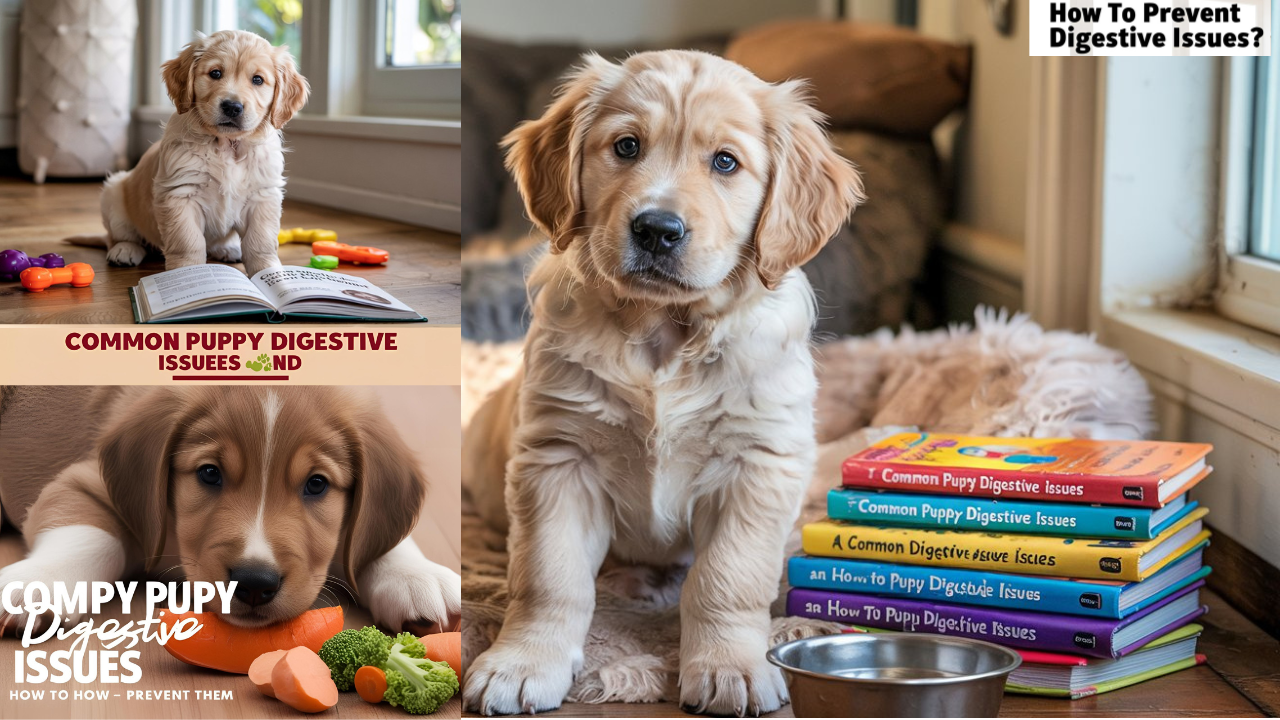The energy-filled personalities of puppies include their combination of curiosity as well as their lively tendencies. Puppies maintain immature facilities for digestion within their bodies at this developmental stage. The developing system of their digestive tract leaves puppies vulnerable to stomach issues. The knowledge of typical puppy digestive problems and their preventive measures should be fundamental to all pet owners. Puppy digestive issues, Proactive treatment provided at the beginning will prevent more significant medical challenges from developing.
1. Diarrhea
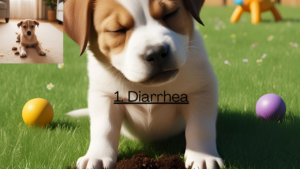
The most widespread condition in puppies happens to be diarrhea. The onset of these issues results from various potential causes. A quick alteration to diet represents a major factor leading to this condition. Parasites and infections together with stress can be among the factors which lead to its occurrence. Puppies explore with their mouths. The puppies sometimes consume spoiled food items along with rubbish and dangerous plants that become toxic when eaten by them.
Prevention tips:
- Stick to a consistent diet.
Your puppy should only receive food from their regular diet because avoiding new or inappropriate treats is essential.
Your puppy should avoid contact with unsanitary water sources along with trash.
Your veterinarian will provide the correct schedule for deworming your pet.
Slowing down the introduction of new food items to your puppy should occur during a seven to ten-day period.
2. Vomiting
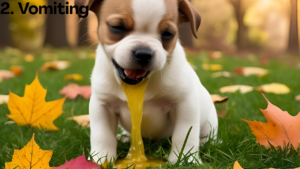
Puppy digestive issues, the occurrence of vomiting in puppies remains occasional. Regular vomiting episodes should prompt you to seek veterinary care. The causes of vomiting in puppies include fast eating habits or allergic reactions to food as well as infections or potentially swallowed foreign objects. Young dogs use their mouths to bite socks as well as toys as well as shoes. Foreign objects that puppies swallow will create an obstruction within their stomach or intestines.
Prevention tips:
- Feed smaller meals more often.
Use a slow-feeder bowl.
Setting up boundary areas containing small objects for your puppy requires thorough dog-proofing of your house.
After playtime avoid letting your puppy consume big amounts of water in a short period of time.
3. Constipation

A problem of constipation occurs when stool becomes hard or disappears for longer than 24 hours. The condition results from dehydration together with insufficient diet and minimal exercise activities. Puppies have a tendency to consume foreign items such as grass and hair masses that could produce intestinal blockages.
Prevention tips:
- Fresh water should be continuously accessible to the patient.
- They should consume fiber as needed.
- Encourage daily play and exercise.
- Regularly following the grooming schedule helps decrease the amount of hair swallowed by your dog.
4. Intestinal Parasites
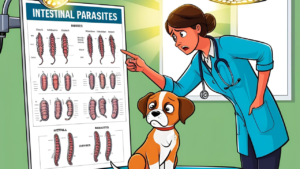
Roundworms together with hookworms and giardia are regular parasites that affect puppies. The pests occupy the intestinal space thereby leading to diarrhea which results in vomiting and weight reduction together with bloating. Worms often infect new-born puppies or puppies gain them through milk received from their mothers.
Prevention tips:
- Administer deworming medication to puppies under the guidance of your veterinarian.
Emergency clean-up of stools during each diuretic episode prevents puppy reinfection.
Refrain from allowing moisture to accumulate in the housekeeping areas.
Pet owners should request stool tests from their veterinarian during regular veterinary check-ups.
5. Food Intolerance or Allergies

A number of puppies develop digestive problems when eating specific food items. The digestion systems of puppies frequently become irritated by eating dairy or beef or chicken or wheat foods. The symptoms of stomach discomfort and inflammation may present as diarrhea with gas, itchy skin problems and ongoing ear infections. The human body reacts differently to food intolerance since this condition bypasses immune system involvement.
Prevention tips:
- Search for symptoms connections that appear throughout the meal period.
Remove each doubtful food surplus one by one.
Choose high-quality, limited-ingredient food.
Consult with your veterinarian about performing allergy tests when symptoms continue after considering different treatment methods.
6. Gastroenteritis
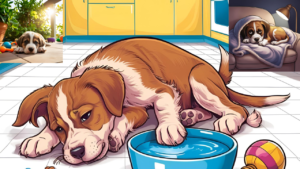
Gastroenteritis refers to the condition where stomach and intestinal inflammation occurs. The illness leads to continuous vomiting and diarrhea followed by high temperature and extreme tiredness. The condition originates from three primary sources including infections together with toxics and spoiled food. No treatment for gastroenteritis will result in dehydration or more severe health consequences.
Prevention tips:
- The storage of covered trash and safe food placement needs to be kept secure.
- Keep your dog from using public bowls and keep him away from unclean areas while walking outdoors.
- Stay up to date on vaccines.
- Make a visit to the veterinarian if your pet shows ongoing symptoms exceeding one day.
7. Pancreatitis

Pancreatitis occurs when inflammation takes place in the pancreas. This P occurs after someone consumes foods that contain fat or have high richness levels. The P triggers vomiting and lethargy together with acute pain after consumption. It’s rare but serious.
Prevention tips:
- Table scraps together with fatty foods should be completely avoided from the puppy’s diet.
- Pharmacists should recommend eating foods that match puppies’ needs while maintaining proper nutrition.
- Do not let your puppy approach food waste or leftover items.
8. Bloating (Gastric Dilation)
Every puppy runs the risk of bloating despite the fact that it happens most often in large breeds. Gas accumulation and food expansion both contribute to the distension of the stomach known as bloating. A stomach twist occurs in occasional cases. The condition demands urgent medical attention because it could become fatal.
Prevention tips:
The water supply must remain fresh constantly.
Hunger for fiber should be included in their regular food plan.
Encourage daily play and exercise.
Regularly scheduled grooming sessions will help limit their intake of hair.
General Tips to Keep Your Puppy’s Digestion Healthy
- Your puppy should receive its meals at the same hour each day.
- Select pure puppy food manufactured from organic components that would prove suitable for your puppy.
- Daily water bowl changes should become your habit together and with regular inspections of the water supply.
- Treats should be given in reasonable quantities and healthy alternatives should be chosen.
- The vet should conduct scheduled appointments because early diagnosis depends on them.
- Regular observation of your puppy should include monitoring their behavior and stool output and eating habits.
When to See the Vet

Always trust your instincts. Puppies who show signs of weariness need fast veterinary attention and the puppy requires immediate veterinary consultation not only when it stops eating food but also when it shows symptoms of pain. Moreover, early detection can prevent serious health issues. Visits to the doctor become necessary for any abrupt changes in stool or vomiting that continues beyond 24 hours. Puppies become dehydrated at a quick rate.
Your puppy depends on you. Basic preventive measures combined with your understanding of puppy digestive problems will lead to the development of a strong healthy dog. Tending to their digestive health will result in endless tail wags and unconditional love from them throughout their lifetime.
1. What are the most common digestive issues in puppies?
The most common issues include diarrhea, vomiting, constipation, intestinal parasites, food allergies, gastroenteritis, pancreatitis, and bloating.
2. Why does my puppy have diarrhea suddenly?
A sudden change in diet, stress, parasites, or eating something inappropriate (like trash or spoiled food) can cause diarrhea.
3. How can I prevent my puppy from vomiting?
Feed smaller meals, avoid fatty foods, use a slow-feeder bowl, and keep your puppy from chewing or swallowing non-food items.
4. How often should I deworm my puppy?
Most vets recommend deworming every 2–3 weeks until the puppy is 12 weeks old, then monthly until 6 months, and as needed after that.
5. What foods can cause allergies in puppies?
Common allergens include dairy, beef, chicken, wheat, and soy. Watch for symptoms like itchy skin, chronic ear infections, or upset stomach.
6. Is it normal for a puppy to have occasional stomach upset?
Occasional mild upset is normal, especially during food transitions. But frequent vomiting or diarrhea should be checked by a vet.
7. What should I do if my puppy eats something harmful?
Contact your vet or an emergency pet clinic right away. Some items can cause blockages or poisoning and require urgent care.
8. How can I support my puppy’s digestive health daily?
Feed a high-quality puppy diet, provide clean water, keep a regular schedule, limit treats, and avoid giving table scraps.
